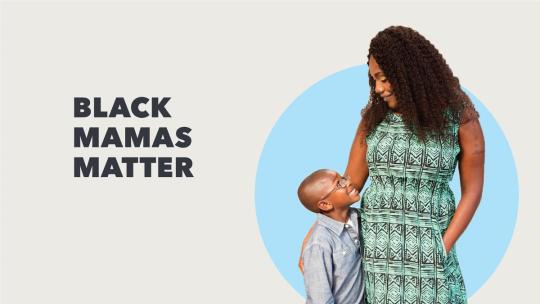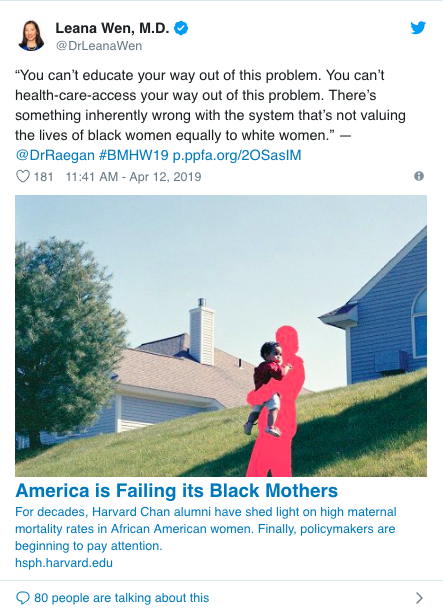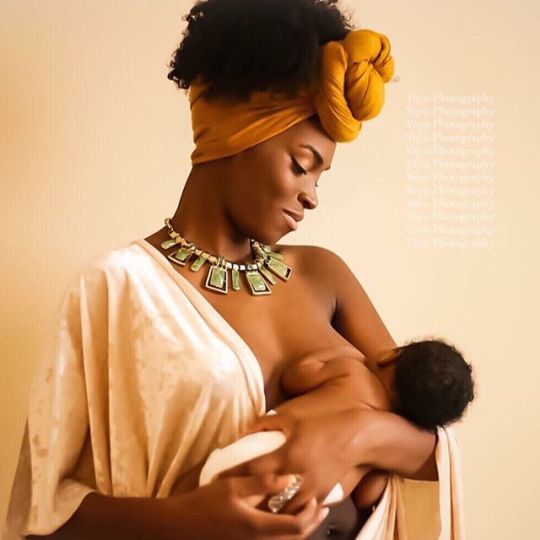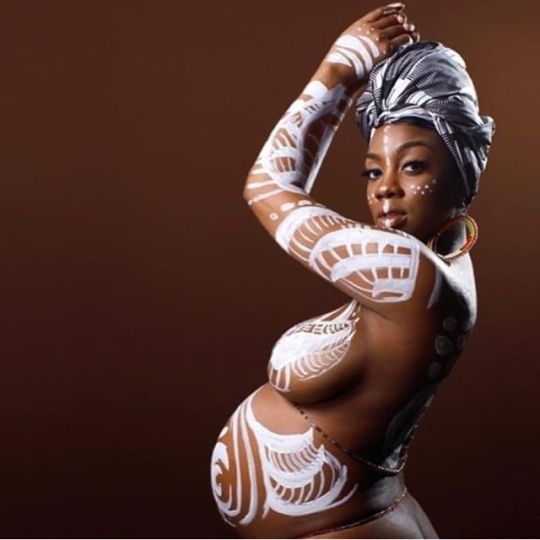#bmhw19
Text
Black Maternal Health Week: Why We Can’t Be Silent

One patient’s Black maternal health journey taught her that her personal experience was actually systemic.
This post is by Neatrice Holmes, a Planned Parenthood volunteer in Baltimore. We’re sharing it as part of Black Maternal Health Week — an initiative spearheaded by the Black Mamas Matter Alliance (BMMA) in which Planned Parenthood is joining patients, providers, and advocates across the country in lifting up the need for maternal health research that centers Black women.
Last June, I found out I was seven weeks pregnant. I'd always been told by doctors that I couldn’t have children, so this was completely unexpected. I was excited to embark on this new journey, and to raise a child with my partner.
My first meeting with my obstetrician seemed normal and routine. We went through all the regular tests and I was told that my pregnancy was considered “high risk” because of my age. Though I had wanted a Black doctor, like my usual primary-care physician, I still left feeling confident that I was in good hands.
By the second appointment, everything had shifted.
Though my obstetrician was great, it was clear that other people in the hospital didn’t care. Suddenly my prenatal visits were rushed, tense, and demeaning. Despite being a pregnant patient over the age of 35, nurses weren’t taking my concerns seriously. Questions I had about aches and pains were dismissed. They didn’t treat me as a high-risk patient and I didn’t get the care I deserved.
When I went to get genetic testing, I was told there was an abnormality and if I had a baby, it might not live. It was only when I started asking questions and advocating for myself that the counselor admitted there was a margin of error and there were other, more precise tests we could do.
I was also subject to pre-judging. They automatically assumed I did not have insurance or used Medicaid, even though I have a full-time job as an insurance manager, working with patients with kidney disease, and have medical coverage through my employer. When I started wearing scrubs in an effort to be more comfortable, the assumption was that I didn’t have a college degree and worked in a hospital as an assistant. Of course, if any of those things were true, I would have still deserved competent medical care –– what stung was that they didn’t take the time to ask about my situation or experiences. They took one look at me and wrote my story themselves. That’s not how health care should work.
They didn’t take the time to ask about my situation or experiences. They took one look at me and wrote my story themselves. That’s not how health care should work.
Near the end of the first trimester, I was sent to another hospital for a fetal echocardiogram. My partner and I arrived anxious and excited to hear the heartbeat. We couldn’t have imagined what was to come.
As I took my clothes off, the doctor noticed a scar I have from a medical procedure and screeched, “what is THAT?” I’m very sensitive to touch and when I recoiled slightly as she was touching me, she coldly asked why I was flinching –– completely oblivious to the fact that every patient is different.
The ultrasound showed there was no heartbeat, and my heart sunk. There was no compassion in the doctor’s voice when she gave me the news and none when I frantically asked if they could check again.
My head spun as my partner started crying and my body had an immediate physical response to the trauma: I began vomiting on the table.
All the doctor said was, “Why are you throwing up? Are you sick?”
As I dragged myself to the bathroom, my doctor made no move to assist me, no move to console my partner.
The doctor called for three nurses and as they peered in on me in the bathroom – by now throwing up and dealing with diarrhea –– all they said was, “what’s wrong?”
What’s wrong? What’s wrong?
The ultrasound showed there was no heartbeat, and my heart sunk. There was no compassion in the doctor’s voice when she gave me the news.
I had just found that the future I had imagined with my baby was over. My body was convulsing. My partner and I were being treated like we were worthless, without an ounce of compassion. And they were asking me what was wrong.
I was told I would need to have a dilation and curettage procedure, and sent home with medication to soften my cervix. I was told I’d experience some minor cramps that could expel some fetal tissue. They said to call the on-call nurse if I had any issues.
What they didn’t say was that there was a possibility I could have labor-like cramps that would cause me to expel nearly all the fetal tissue at home. At 3 a.m. the next morning, I began bleeding.
Completely unprepared, I woke my partner and made my way to the bathroom. I waited at first to call the on-call nurse, even as the pain of my cramps grew and grew. I had no idea that this wasn’t normal. I waited as long as I could, until the cramps became so acute that it felt like labor — until I had a miscarriage.
Distraught, I finally made the call but the nurse said to only come in if I couldn’t control the bleeding, adding: “… but it doesn’t sound like you need to come in.”
I felt like me and my child were thrown away –– and no one should have to feel like that.
I expected that I could have a service, to honor the life I had planned to bring into this world. But I never even got the option. When I brought the remains of my pregnancy in the next day, the hospital lost them during routine lab work. To this day, I don’t understand how that could happen but I was too depressed to push the issue.
I felt like me and my child were thrown away –– and no one should have to feel like that.
It wasn’t until I had this experience that I started learning more about Black women’s maternal health. I kept buying books and researching –– and learned that what I thought was a personal experience was actually systemic.

Black women are dying at a rapid rate, and even more are having traumatic maternal health experiences. In too many cases, racism and implicit bias are to blame. There’s a long history of medical mistreatment of Black people in this country, rooted in slavery. Doctors and nurses think we have a superpower for pain; they think we’re workhorses; they even used to experiment on us.
It’s hard to put into words just how I was treated. So much of it was in the little details that are felt so clearly but impossible to prove. I’m sharing my story because as horrifying as it is, I know that some women have even died from poor maternal health care. It’s crucial that we shine a light on this and hold health care providers accountable.
Black women and Black mothers deserve better. And we won’t be silent until we have the health care we deserve.
Neatrice Holmes is a storyteller from Baltimore, Maryland, where she volunteers with her local Planned Parenthood. Currently she is an insurance counselor, community healing advocate, community activist, Reiki practitioner, and LEAP (Listen, Empathize, Agree, Partner) trainer with the LEAP Institute. She was inspired to share her story and fight for reproductive health care when Senator Kamala Harris introduced a bill aimed at reducing racial disparities in maternal mortality among Black women.
5K notes
·
View notes
Photo



This Black Maternal Health Week, outlets should commit to reporting the facts about our nation’s climbing maternal death rate, the disproportionate effect on the Black community, and the organizations working year-round to end this epidemic.
#Black Maternal Health Week#BMHW#BMHW19#Black Maternal Health#Black Lives Matter#media#media coverage#mainstream media coverage
593 notes
·
View notes
Photo

#gentlereminder #Repost @naralprochoicega ・・・ Did you know Georgia has the highest maternal morality rate in the nation and Black women are 3 to 4x more likely to experience a pregnancy-related death than white women? Meanwhile, Georgia lawmakers are busy attacking reproductive rights. Today is the first day of Black Maternal Health Week. Follow @blackmamasmatter to keep up. #BMHW19 #PissedOffPeaches #HowDareYou ・・・ #vibewise: Call me old fashioned but I still believe #AWOMANSDECISION is a woman's decision. I mean, how can the same idiots that oppose #affordablehealthcare impose bill in the best interest of women? Are we supposed to forget Georgia has the highest maternal mortality rates in the United States? I mean, how could the same state that put #educators in prison possibly care about fetal life? When are we gonna talk about juveniles being sentenced as adults in this state? Don't worry we'll #ReclaimGeorgia by electing delegates that actually confer with the constituent body. Question: How do you suppose we #endrapeculture while #legislation is being forced to take hold of #awomansbody? I don't understand why the State of Georgia wants control of a woman's body... Does anyone else see #theelephantintheroom? Can't you see, they're stripping "the rights" right off of women? How long must ye pretend to turn a blind eye?! How'd we'd let these weak men legislate rape? Why isn't the #LIFEact considered as a form of forcible rape? I mean, Kemp just signed a bill to coerce consent of a woman's body! #mypoemsarenotpoems... and I say that to say: May the words "#forciblyandagainstherwill" resound throughout the room. But don't mind me, I just tend to think rape occurs when the victim may be legally incapable of consent... Then again, who am I to ponder historical legal definitions, the police shoot and kill people that look like me on Facebook Live and the grand jury seems to always find a way to turn a blind eye. -Stevie #womensrights / #artisactivism | #scribesandvibes #adifferentkindofvibe #unorthodoxtribe https://www.instagram.com/p/BxM_n6LhzPd/?igshid=x5j3vbk41xoo
#gentlereminder#repost#bmhw19#pissedoffpeaches#howdareyou#vibewise#awomansdecision#affordablehealthcare#educators#reclaimgeorgia#endrapeculture#legislation#awomansbody#theelephantintheroom#lifeact#mypoemsarenotpoems#forciblyandagainstherwill#womensrights#artisactivism#scribesandvibes#adifferentkindofvibe#unorthodoxtribe
0 notes
Photo

#Repost @sistafireri with @get_repost ・・・ #believeblackwomen #Repost @blackmamasmatter (@get_repost) ・・・ This is so real. (Image via @elyselovemd) #BlackMamasMatter #BlackMaternalHealth #BlackMaternalHealthWeek #bmhw19 https://www.instagram.com/p/BwlJLEMn853/?utm_source=ig_tumblr_share&igshid=1k4qqnnmcstcc
0 notes
Photo

Reposted from @blackmomsblog - @bloom.life: "The reasons for the black-white divide in both infant and maternal mortality have been debated by researchers and doctors for more than two decades. But recently there has been growing acceptance of what has largely been, for the medical establishment, a shocking idea: For black women in America, an inescapable atmosphere of societal and systemic racism can create a kind of toxic physiological stress, resulting in conditions — including hypertension and pre-eclampsia — that lead directly to higher rates of infant and maternal death. And that societal racism is further expressed in a pervasive, longstanding racial bias in health care — including the dismissal of legitimate concerns and symptoms — that can help explain poor birth outcomes even in the case of black women with the most advantages." - NYTimes, "Why America’s Black Mothers and Babies Are in a Life-or-Death Crisis". TW: Article references infant loss and maternal death. . Staggering statistics like this are why #BlackMaternalHealthWeek19 is so important, and addressing them takes a multi-disciplined approach across medical, cultural, and social lines as this article illustrates. If you haven't yet, join the movement, find local events, register for national #BMHW19 webinars, and make clear that #BlackMamasMatter, by signing up at http://bit.ly/blackmamasmatter. . Illustration by @chelslarss, because it was important to us to represent actual human beings. Statistics via CDC: bit.ly/cdcPCMSS . . . #BMMA #prenatalhealthrevolution #highriskpregnancy #blackmaternalhealth #womenshealth #maternalhealth #healthypregnancy #pregnancy #cdc #blackwomenmatter #listentoblackwomen" - #regrann https://www.instagram.com/p/Bwa8o15J0Yh/?utm_source=ig_tumblr_share&igshid=15pew9wrq55wc
#blackmaternalhealthweek19#bmhw19#blackmamasmatter#bmma#prenatalhealthrevolution#highriskpregnancy#blackmaternalhealth#womenshealth#maternalhealth#healthypregnancy#pregnancy#cdc#blackwomenmatter#listentoblackwomen#regrann
1 note
·
View note
Photo

We are at the end of national Black Maternal Health Week but the start of so many opportunities to make #BlackMamasMatter! I’ve learned so much from passionate innovators in the field and I am overjoyed for @newvoices4rj to be connected to @blackmamasmatter and @rootrj. Thank you to all the Black mamas, midwives, doulas, birth workers, healers, caretakers and doctors committed to our health and well-being. #bmhw19 #blackmaternalhealthweek #blackmaternalhealth #reprojustice #reproductivejustice #trustblackwomen (at Pittsburgh, Pennsylvania) https://www.instagram.com/p/BwYADqpgkdq/?utm_source=ig_tumblr_share&igshid=11s14gso0nohk
#blackmamasmatter#bmhw19#blackmaternalhealthweek#blackmaternalhealth#reprojustice#reproductivejustice#trustblackwomen
0 notes
Photo

Posted @withrepost • @minkieenglish You talk about the issues with girlfriends, family members and perfect strangers, you have your own story, and you do the research to expand your awareness, but then you realize that these are all issues that have long existed and Black women have silently dealt with it or created their own safe spaces for survival. Black Maternal Health Week started on April 11th and maybe I've missed the conversations, but the silence continues. It's great that there is more focus, research, hashtags, and pockets of conversations on this issue and our needs but spreading awareness/education even if you are not directly affected is up to us, because you or a Black woman 6 degrees removed from you has been or will be affected. #blackmaternalhealthweek #blackwomen #wellness #bmhw19 Reposted from @mediamattersforamerica and @acog_org. (at Buffalo, New York) https://www.instagram.com/p/BwTLls7H4b3/?utm_source=ig_tumblr_share&igshid=k09ce0tchmt7
0 notes
Photo

discovering & introducing Talaya of @DoulaLove_ForAll, currently a doula in LA and possibly a future student midwife! this is a gorgeous shot of Talaya pregnant & floating underwater. photo by @2020retrospect 🖤 #blackmamasmatter #blackmidwivesmatter #fundblackmidwives #blackmaternalhealthweek #bmhw19 https://www.instagram.com/p/BwSj8JyHKqA/?utm_source=ig_tumblr_share&igshid=rvailsk9tip2
0 notes
Photo

Do you know the story of your conception and birth? Are you aware of how it has informed your life, your relationship with your body, reproductive potential and sexual expression, the conception and births of your own children, and the messaging about pregnancy, childbirth, and parenting you will pass on to your children and those you influence? Much of the focus of #BlackMaternalHealthWeek will be on socioeconomic factors and cultural biases that affect maternal healthcare and outcomes and this is important. It is also important to highlight the role generational trauma plays in black women's birthing experiences. There is a story in this photo that I don't have permission to share in its entirety, but I will tell you that it includes a history of sexual trauma, cervical cancer, infant loss, laboring alone, mothering alone, financial insecurity, guilt, shame, regret, and continued loss of reproductive health. This is the story of my conception and birth. If we want to improve outcomes, we must also be willing to have courageous conversations around what we have internalized, perpetuate, and continue to be complicit in in our homes and communities. We must be willing to do our own inner work to heal ourselves and our lineages. Otherwise, all we're doing is putting a bandage on a gaping wound. #bmhw19 #motherbirthing #motherwounds #decolonizebirth https://www.instagram.com/p/BwLctCLgqy0/?utm_source=ig_tumblr_share&igshid=rmb6s0bra1oj
0 notes
Photo

😍 💪🏽 If you are a mom or soon to be mom, concerned grandma, auntie or friend, check out our list of breastfeeding resources for Black women. 👉🏽 Link in bio. . . . 📷: @itsjeanine_ / @yeyo.photography ・・・ • 4 weeks ago I gave birth to this precious boy. Labor was hard, recovery feels harder, but nothing feels better than being his mother. ⠀⠀ ⠀⠀ •The strength and resilience it takes to love and care for a child teaches you a lot about yourself. Because of Justus, I’ve been able to release fear and doubt. I now know that I can do anything. ⠀⠀ ⠀⠀ • Happy 4 weeks, son 👩👦💙. ⠀⠀ ⠀⠀ • Thank you @yeyo.photography 📸 for the beautiful photos and opportunity. If you aren’t already, follow @blackmomsblog & @justusgrowingup! ⠀⠀ ⠀⠀ ⠀⠀ • #blackmomsblog #blackgirlmagic #melaninpoppin #blackmoms #melaninmom #blackmomsdobreastfeed #blackmomsbreastfeed #bmhw19 #blackmommagic #blackmamasmatter #blackmomsmatter #melaninmama #melaninmamas #naturalhairmom — view on Instagram http://bit.ly/2V9QOO1
0 notes
Text
Black Maternal Outcomes a Concern, New State Action Can Help
April 11-17 is Black Maternal Health Week. To learn more about issues and stories concerning Black maternal health, please visit blackmamasmatter.org or follow the social media hashtags: #BMHW19 and #BlackMaternalHealthWeek
The welcoming of a child should be an exciting time for families. People that call Virginia home hope to have good health outcomes for mothers and their child while starting their new journey as a family. Unfortunately, for too many Black women and families this has not always been the case, and there is clear evidence of this when looking at maternal mortality outcomes. Thankfully, there are a couple of legislative moves that are expected to help provide more health coverage and insight into how the state should respond to these outcomes.
The United States as a whole has seen maternal mortality rates more than double since 1999. And disparities in maternal mortality have come under continued scrutiny. A report from 2017 noted that Black women in the United States are roughly 2.6 times more likely than all women to die during pregnancy or within one year of pregnancy.
A similar trend is seen here in Virginia, where the last two years of data (2015-2016) show higher mortality rates for women overall, including Black women. But maternal outcomes for Black women continue to be a particular and significant concern. In the last decade for which there is available data, Black women in Virginia were 1.4 to 3.3 times more likely to die during pregnancy or within six weeks of the end of pregnancy than the total population.

With expanded Medicaid coverage having taken effect earlier this year, more women will receive ongoing care prior to and after pregnancy. Prior to expansion, pregnant women were only covered from pregnancy to two months after the end of pregnancy. With newly increased eligibility, many new mothers will be able to continue having health insurance after those two months.
State lawmakers also passed legislation that created the Maternal Mortality Review Team, under the umbrella of the Virginia Department of Health. This team will investigate and review data on maternal mortality in order to help better understand and address issues in maternal mortality. Their work will eventually lead to recommendations on policies and programs. The legislation is written to investigate all instances of maternal mortality, but without the intentional study on the outcomes of Black women, the recommendations will run the risk of missing the mark.
While this legislation can help improve maternal outcomes for all women, it won’t fix the racial discrimination Black women experience in medical settings and in everyday life. Black women more often experience a lower quality of health care compared to their white counterparts. Additionally, the experience of discrimination and the stress associated with it, including while accessing health care, has been shown to lead to poorer health outcomes for mothers and their children during pregnancy. Finding ways to further boost Black participation in the medical field, such as lowering the out-of-pocket costs of attending medical school, and ensuring access to quality and culturally responsive treatment could help address the physical and mental tolls of racism in expecting Black mothers.
One avenue the state should consider is increasing access to doula services. Doulas are trained professionals who provides physical, emotional, and informational support to a mother before, during, and shortly after childbirth. Their services are generally seen as part of a more holistic and culturally responsive system of care. Currently, Minnesota, Oregon, and New York offer Medicaid reimbursements for these services as a way to address the issue of maternal mortality. If Virginia followed suit, it could help to protect the lives of new mothers and their children, because doulas are positively associated with lower rates of pre-term birth and cesarean delivery as seen in the Minnesota Medicaid population.
Medicaid expansion was a step in the right direction towards lowering the number of Black lives lost during or after pregnancy by promoting access to quality coverage. Meanwhile, the work of the Maternal Mortality Review Team will only prove helpful if bolstered by future state action and investments. Targeted interventions are needed in order to see meaningful progress in health outcomes for Black mothers in Virginia.
-- Freddy Mejia, Policy Analyst
Print-friendly Version (pdf)
Learn more about The Commonwealth Institute at www.thecommonwealthinstitute.org
0 notes
Photo

@newvoices4rj x @roottrj = #BLACKJOY and super duper dope #ReproJustice in #Ohio! #TrustBlackWomen #BMHW19 #BlackMamasMatter #NewVoicesOH (at Columbus, Ohio) https://www.instagram.com/p/BwLkYQzAuRv/?utm_source=ig_tumblr_share&igshid=1mwh1o2jr0hqx
0 notes
Photo

loving this art put together by @thehomegirlbox. and i agree, black mamas matter...every day. • “✊🏿 Black Mamas Matter EVERY DAY ✊🏾 Shout-out to all the birth justice and reproductive justice organizers and activists who are calling for all of us to fiercely support and protect Black mothers. We see your labor and love 💗 The love Black mamas give is magical.” • #BlackMaternalHealthWeek #BlackMamasMatter #BMHW19 https://www.instagram.com/p/BwSgog2nwcr/?utm_source=ig_tumblr_share&igshid=1olqmdzmy89ks
0 notes
Photo

Starting Black Maternal Health Week with the passing of SB1033, a bill that sounds like it's a good idea for everyone on the surface, because licensing midwives sounds like a good idea, right? But it will effectively erase indigenous and traditional midwifery in Hawaii, as well as limit the expectant's choices in childbirth. All because a few so-called well-meaning yt feminists want to make birth safe for everyone. Ain't nobody free til we're all free. Follow @blackmamasmatter #BlackMaternalHealth #BlackMaternalHealthWeek #BMHW19 to see what #birthworkers and #maternalhealth advocates are doing in their communities to #decolonizebirth. https://www.instagram.com/p/BwJPue4ANds/?utm_source=ig_tumblr_share&igshid=3kony4lvp7j0
0 notes
Photo

It's Black Maternal Health Week. Visit @blackmamasmatter for details and to get involved. #BMHW19 . . . 📷: @tpatthe_fabb_boss I am a WOMBman... A visual depiction of strength and vulnerability... The epitome of nurture and protection... Everything beautifully crafted to perfection... Nature-made, No GMO... Special thanks to my team. You helped my visual come to life!! Photographer: @deaanpridgeon Artist: @theblackonion Studio: @edudancestudio Visual directors: @urban_argyle @pagingdr.juju Never knew a LOVE like this before...💙 #melaninmama #blackgirlmagic #wakanda #blackmaternalhealthweek #melaninmom #naturalhairmom #blackmommagic #blackmomsmatter — view on Instagram http://bit.ly/2UOZcm0
0 notes